When choosing a generator for your food truck, you need to assess your power needs by listing all appliances and their wattage. Consider fuel options like solar, hybrid, or gasoline, based on your budget and eco priorities. Opt for a portable, space-efficient model that minimizes noise and emissions. Keep an eye on long-term costs and maintenance to guarantee reliable, cost-effective operation. To make the best choice fast, keep this guide handy as you explore your options.
Key Takeaways
- Assess total power needs by listing appliances and their wattages to select a generator with adequate peak capacity.
- Consider fuel options like solar, hybrid, or traditional fuels based on efficiency, environmental impact, and budget.
- Choose lightweight, compact generators that fit space constraints and are easy to transport and set up.
- Opt for quieter, eco-friendly models with noise reduction features to minimize disturbance and comply with environmental standards.
- Evaluate long-term costs including purchase, maintenance, fuel consumption, and warranty coverage for cost-effective operation.
Assessing Your Power Needs and Equipment Requirements
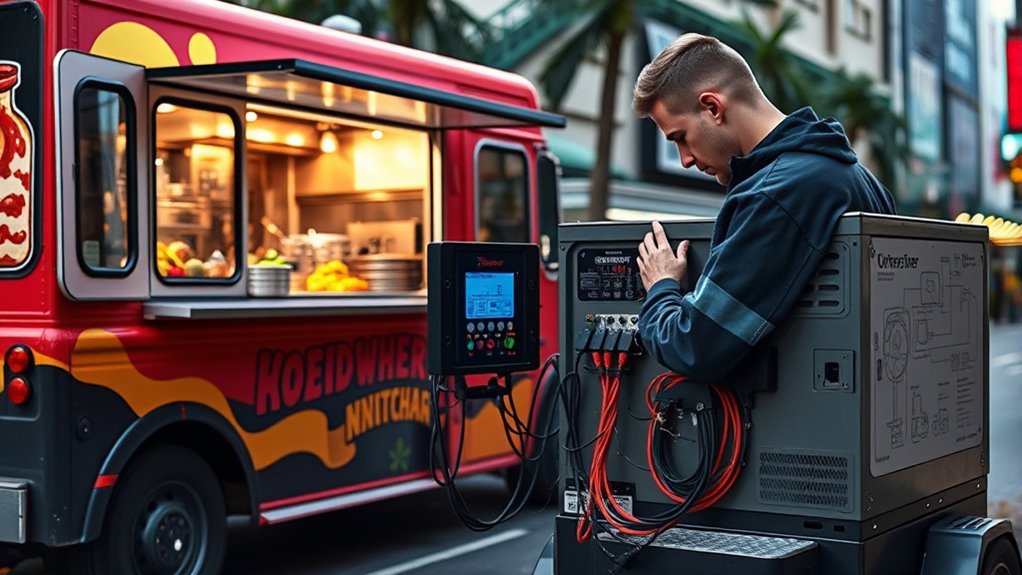
Before choosing a generator, you need to determine your food truck’s total power requirements. Start by listing all the appliances and equipment you’ll run, like refrigerators, fryers, lights, and POS systems. Check each device’s wattage and add them up to find your total power needs. This step guarantees you select a generator that can handle your peak load safely, promoting electrical safety and preventing overloads. It’s also wise to review generator warranties; a reliable warranty offers peace of mind and protection against manufacturing defects. Knowing your exact power requirements helps you avoid purchasing an underpowered unit that hampers operations or an oversized one that wastes fuel. Accurate assessment is essential to keep your food truck running smoothly and safely on the road.
Exploring Fuel Options and Efficiency
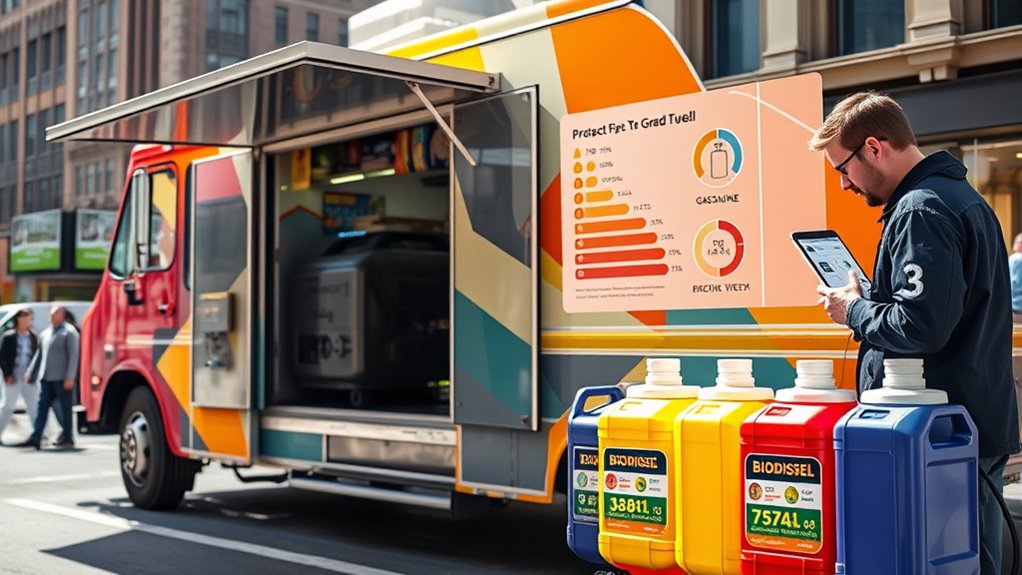
Choosing the right fuel type for your food truck generator can substantially impact your operating costs and convenience. Solar power offers a clean, renewable option that reduces fuel expenses and emissions, making it ideal for eco-conscious operators. You can integrate solar panels with your generator in a hybrid system, allowing you to switch between solar and traditional fuel sources based on availability and demand. Hybrid systems enhance efficiency by optimizing fuel use and minimizing downtime, especially during cloudy days or high-demand periods. Gasoline and diesel generators are more common but can be costly over time due to fuel prices and maintenance. Carefully weigh your energy needs, budget, and environmental priorities when exploring these options to ensure you choose a fuel system that maximizes efficiency and sustainability. Low carb foods are also an important consideration for health-conscious operators who want to maintain optimal energy levels while running their food trucks.
Evaluating Portability and Space Constraints
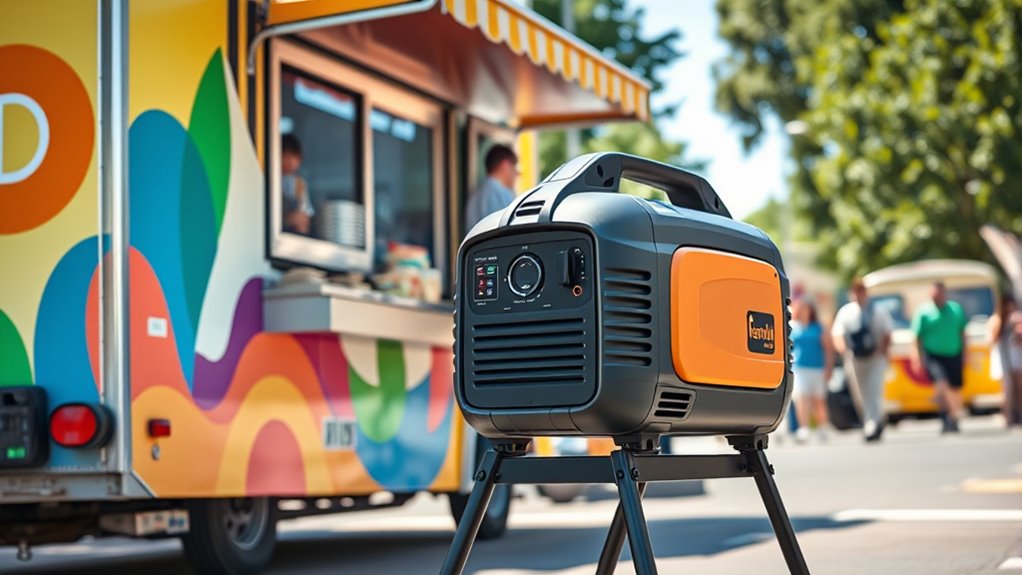
When selecting a generator for your food truck, considering portability and space constraints is crucial to guarantee smooth operation and easy mobility. You need a unit that fits comfortably without adding excessive trailer weight or compromising storage capacity. A lightweight, compact generator ensures you can maneuver and park easily, especially if space is limited. Think about:
Choose a lightweight, compact generator to ensure easy mobility and efficient space use for your food truck.
- Trailer weight limits and how the generator affects overall weight
- Storage capacity for fuel and accessories
- Ease of transportation and setup
- Size and dimensions relative to available space
- Weight distribution to maintain stability
Balancing these factors helps prevent overloading your vehicle and ensures you can store the generator conveniently, making your food truck more efficient and mobile. Prioritize portability without sacrificing essential power needs. Additionally, considering lifestyle factors like ease of use and maintenance can contribute to smoother operation.
Considering Noise Levels and Environmental Impact
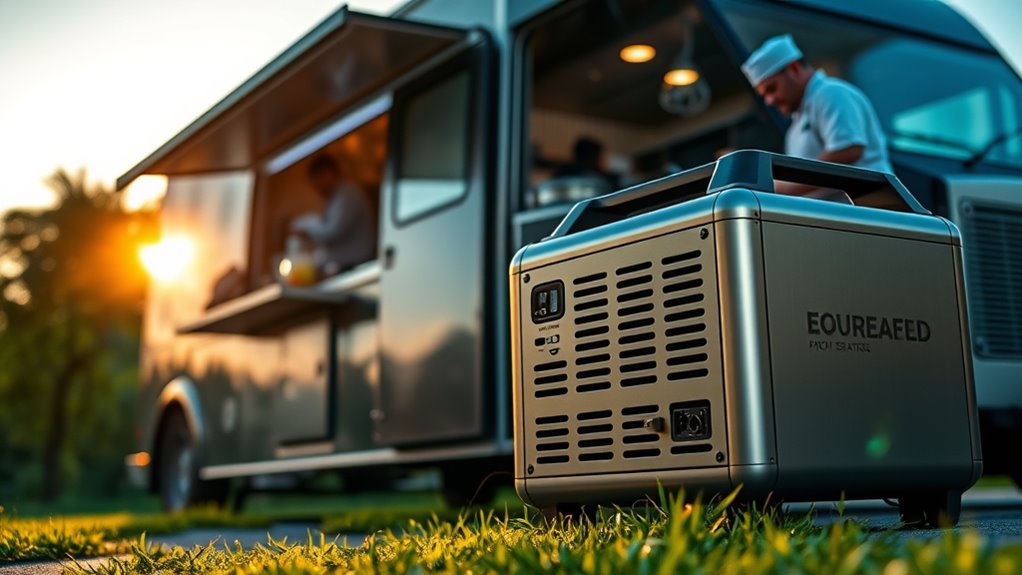
Considering noise levels and environmental impact is essential because a loud generator can disrupt your customers and neighbors, while high emissions can harm the environment. To minimize noise, look for generators with built-in sound insulation or consider adding noise mitigation measures, like barriers or enclosures. These features help reduce sound pollution and create a more pleasant atmosphere around your food truck. Also, check the emissions ratings to ensure the generator meets environmental standards, lowering your carbon footprint. Choosing a quieter, eco-friendly generator not only benefits your surroundings but also enhances your reputation as a responsible operator. Additionally, selecting a generator with vetted noise reduction features can help ensure optimal performance while minimizing disturbance. Keep in mind that quieter models may cost more initially but can save you from complaints and potential legal issues down the line.
Estimating Budget and Long-Term Maintenance Costs
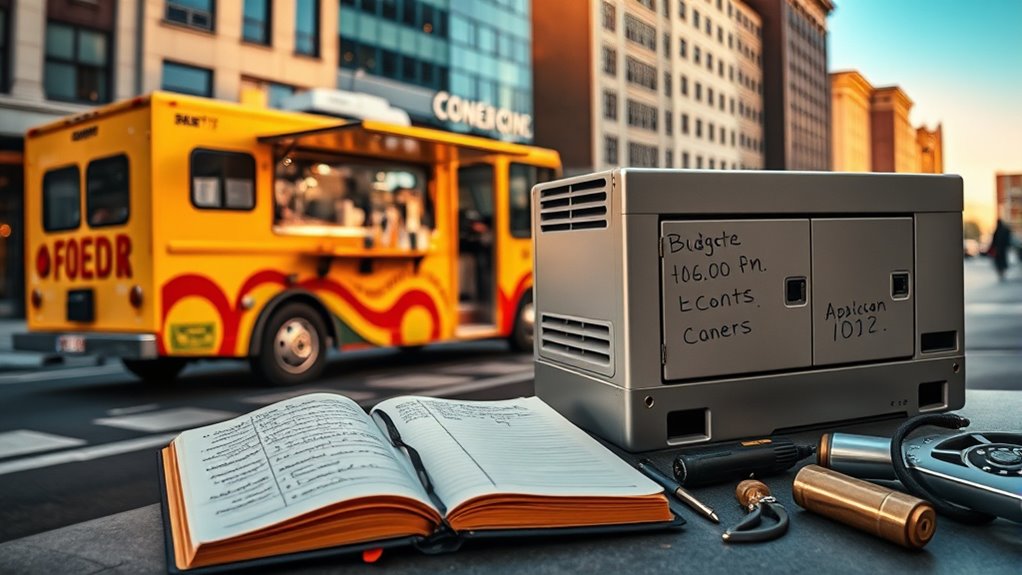
Estimating your budget and ongoing maintenance costs is essential to guarantee your food truck operates efficiently without unexpected expenses. Conducting a thorough cost analysis helps you plan for initial investment and long-term affordability. Consider factors such as fuel consumption, routine repairs, and parts replacement. Don’t forget to review warranty coverage, which can considerably reduce repair costs during the generator’s lifespan. To get a clear picture, keep in mind:
- Initial purchase price and installation fees
- Expected fuel and energy expenses
- Routine maintenance and filter replacements
- Warranty coverage details and limitations
- Potential repair costs beyond warranty period
- Understanding the refrigeration cycle helps in selecting reliable and energy-efficient generators that support your food truck’s cooling needs.
Frequently Asked Questions
How Long Can a Generator Run Continuously During Busy Hours?
During busy hours, your generator can run for several hours continuously, depending on its fuel efficiency and tank size. Most generators last between 8 to 12 hours on a full tank, but higher fuel efficiency means you can operate longer without refueling. Keep in mind, noise levels vary; quieter models are better for customer experience. Always monitor fuel and noise levels to guarantee smooth operation during your busiest times.
Are There Specific Safety Certifications to Look for in Food Truck Generators?
You should prioritize generator safety by guaranteeing it meets certification standards like UL or CSA, which confirm compliance with safety regulations. Look for generators with certification standards that guarantee reliable performance and safety features, such as proper grounding and overload protection. These certifications help you avoid electrical hazards, protect your staff and customers, and ensure your food truck operates smoothly and safely during busy hours.
Can I Use a Portable Generator for Both Cooking and Refrigeration?
You can use a portable generator for both cooking and refrigeration, but you need to think about its power capacity to handle multiple appliances simultaneously. Make sure it provides enough wattage for your needs without overloading. Also, check its noise levels, as quieter models help maintain a better customer experience. Select a generator that balances sufficient power with low noise to keep your food truck running smoothly and comfortably.
What Are the Best Practices for Storing and Maintaining My Generator?
Think of your generator as a trusted partner; regular storage and maintenance keep it reliable. Always store it in a cool, dry place to prevent corrosion, and disconnect the battery for longevity. Check fuel stability by using fuel stabilizers and running the generator periodically to prevent stale fuel. Proper maintenance, like cleaning and inspecting parts, guarantees your generator remains ready, much like a well-tuned engine that keeps your food truck running smoothly.
How Does Altitude Affect Generator Performance and Efficiency?
Altitude affects your generator’s performance and efficiency because higher elevations reduce air density, leading to less oxygen for combustion. You’ll need altitude adjustments to guarantee ideal power output. Additionally, cooling efficiency may decrease at higher altitudes, so regular maintenance becomes even more important. By making proper altitude adjustments, you keep your generator running smoothly, preventing overheating and ensuring it delivers reliable power for your food truck operations.
Conclusion
Choosing the right generator isn’t just a decision; it’s the difference between running a food empire and a chaotic, noise-filled disaster. With the perfect generator, your food truck will operate like a well-oiled machine, serving up delicious meals without a hitch or a whisper of pollution. Don’t settle for less — pick the wrong one, and your business could fold faster than a pancake! Make the smart choice and keep your food truck thriving for years to come.









